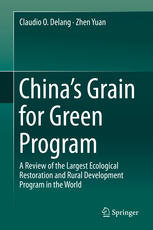

Most ebook files are in PDF format, so you can easily read them using various software such as Foxit Reader or directly on the Google Chrome browser.
Some ebook files are released by publishers in other formats such as .awz, .mobi, .epub, .fb2, etc. You may need to install specific software to read these formats on mobile/PC, such as Calibre.
Please read the tutorial at this link: https://ebookbell.com/faq
We offer FREE conversion to the popular formats you request; however, this may take some time. Therefore, right after payment, please email us, and we will try to provide the service as quickly as possible.
For some exceptional file formats or broken links (if any), please refrain from opening any disputes. Instead, email us first, and we will try to assist within a maximum of 6 hours.
EbookBell Team

5.0
18 reviewsThis book provides a comprehensive review of Grain for Green, China’s nationwide program which pays farmers to revert sloping or marginal farm land to trees or grass. The program aims to improve the ecological conditions of much of China, and the socioeconomic circumstances of hundreds of millions of people. GfG is the largest reforestation, ecological restoration, and rural development initiative in history, combining the biggest investment, the greatest involvement, and the broadest degree of public participation ever.
The book is organised in three sections. Part One reviews the history of land management in China from 1949 to 1998, exploring the conditions that led to the introduction of GfG, and comparing it to other reforestation programs. Part Two offers an overview of GfG, describing the timeline of the program, compensation paid to farmers, the rules concerning land and plant selection, the extent to which these rules were followed, the attitudes of farmers towards the program, and the way in which the program is organized and implemented by various state actors. Part Three discusses the impact of the GfG, from both ecological and socio-economic standpoints, looking at the economic benefits that result from participating in the GfG, the impact of the GfG across local economies, the redistribution of the labor force and the sustainability of the program, in particular the question of what will happen to the converted land when payments to farmers end.